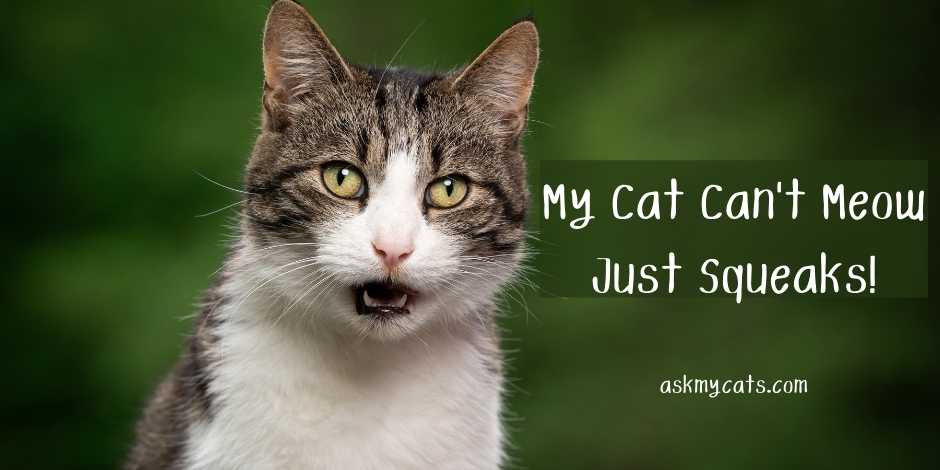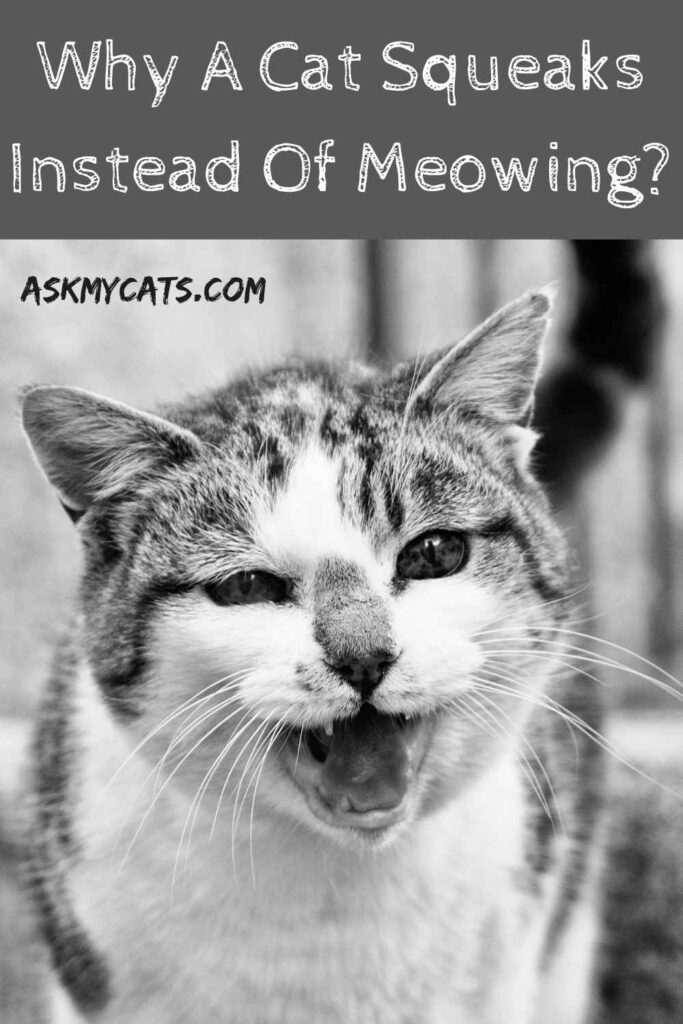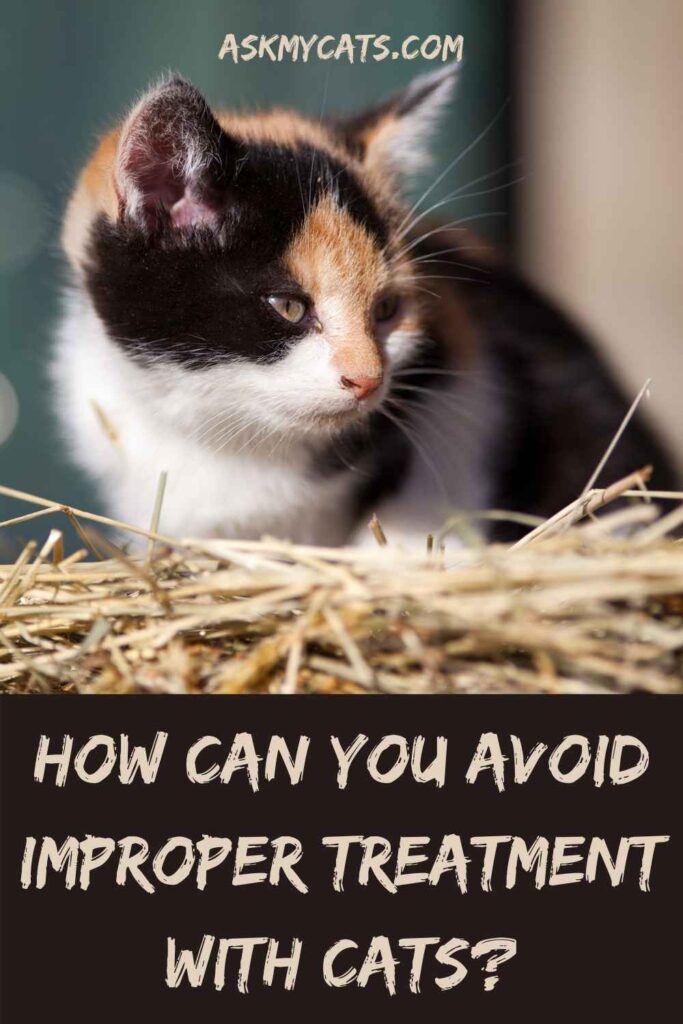Cats, like people, have a variety of personalities. Every cat is distinct from the others, as seen by their distinct mannerisms and habits. Their voices reflect this as well.
The differences in feline personalities have paralleled the differences in comparable sounds.
A cat may squeak rather than meow for a variety of causes, including illness or vocal cord dysfunction. However, it’s possible that it’s merely a passing sound as they grow from a kitten to an adult cat. If it’s the latter, it’s not really an issue or a cause for concern.
So there you have it.
But, in the future, may its squeak turn into a true meow? Is it possible that this is the result of poor treatment? Is it true that all cats meow?
Continue reading for the answers to these questions, as well as much more…


Give Your Cat the Perfect Day
Get the Free Ebook!
Is It Normal For A Cat To Never Meow?
It’s very natural for some cats to meow seldom or not at all. This is especially true if the cats are elderly. With the passage of time, these senior cats’ meowing may decrease. In other situations, they may even quit doing it altogether.
Cats, on the whole, do not meow at each other; they exclusively meow at people. It may also decrease naturally as people become older.
It’s unclear why this is the case.
It might be for energy conservation or just because that is how nature intended it.
If you don’t offer your cat a reason to develop his or her voice, he or she may meow seldom, if at all (but, more on this later).
Why A Cat Squeaks Instead Of Meowing?
Some cats are unable to meow due to the fact that various sounds have various meanings. These kitties do nothing but squeak.
There might be a variety of causes for this, which you should consider or dismiss.
If your cat is just squeaking and not meowing, these are some of the most common causes.

1. Disorder By Birth
The major source of sound generation is the vocal cords. One reason cats are unable to meow is damage to their vocal cords.
A birth defect in a cat’s vocal cords is possible. Some human birth abnormalities, such as blindness and deafness, are analogous to this.
Only a thorough examination by a qualified veterinarian can certify this congenital abnormality. It is true in certain circumstances, but there are other causes as well.
As a result, it’s best to think of this as one probable cause for cats to squeak, rather than the sole one.
2. Improper Growth
Inadequate development of the vocal cords can also cause them to be unable to make a sound.
When a kitten grows into an adult cat, she has a variety of needs that must be met in order for her to mature properly. Similar to any other organism’s growth, these kittens require proper diet and care.
Holding a kitten by youngsters is a simple example of not properly caring for a kitten. Children want to demonstrate their affection for kittens as soon as possible after they are born.
They unintentionally grasp and crush the kitten’s neck forcefully. It can have an impact on the development of the vocal cords.
All of this occurs accidentally and may have an impact on a cat’s capacity to meow.
3. Disease Or Infection
Another reason cats squeak instead of meow is if their vocal cords are infected or diseased. A cat’s vocal cord infection makes it impossible for him to produce any sound other than meow.
Cats can suffer from hyperthyroidism, UPI (Upper Respiratory Infection), laryngeal paralysis, and tumors or polyps, to name a few.
All of these disorders might make it difficult for them to meow, growl, purr, or hiss. Cats may squeak when they are experiencing a problem.
Squeaking instead of meowing can also be caused by other animal throat disorders.
4. Injury
Diseases, infections, and congenital defects have all been mentioned as probable causes of cats squeaking.
Damage to any cat’s organ other than the vocal cords might also be the cause of the cat’s inability to meow.
They may be unable to communicate in certain extreme situations. Cats, like other living beings, can lose their capacity to meow if they sustain a major injury.
5. Weakness Or Hunger
It’s possible that the reason we’re here isn’t serious. Cats are sometimes unable to meow or make any sound because they are hungry and unable to communicate with you.
If you come across a stray cat that is squeaking, it is likely that it is exhausted and weak.
Before she starts making other noises, she has to consume something. Another explanation for the cats’ inability to meow is dehydration.
However, this argument may only apply to cats that are momentarily unable to meow. If you observe cats squeaking, it is preferable to spend some time with them.
After you’ve fed the cat appropriately, keep an eye on them for a few hours. Consult your veterinary practitioner if they are still unable to produce any sound other than a squeak.
6. Feral Cats
Meow is a sound that cats make only to communicate with humans. We may conclude that meowing is a taught behavior based on this data.
Only cats that live near people are able to learn and produce this sound.
Feral cats cannot meow and instead squeak since they have never learned to do so.
So, if you have adopted a new cat and she is unable to meow, don’t be concerned. That cat might be wild and unaware of the meow sound.
Also, check out reasons behind i just adopted a cat and it won't stop meowing
Why Is My Kitten’s Meow Weak?
A kitten’s meow may look feeble for a variety of reasons, including the fact that it is still developing and will alter.
It might, however, be an ailment they’re fighting or an unpleasant event they’ve had, such as being imprisoned somewhere and having to meow more than normal.
If the latter is the case, they may have stretched their vocal cords, causing them to weaken and sound hoarse.
A deep meow, on the other hand, is a distinct sound (click here to see what that is).
Could A Kitten’s Squeak Develop Into A Real Meow?
As a kitten grows older, a squeaky meow may turn into a true meow. As kittens get older, they may take a while to find their true voice.
It can take a year or two for them to fully establish their usual sound in some circumstances.
In any case, a kitten’s meow is higher-pitched than that of an adult cat.
Even if it isn’t squeaky, you may anticipate it to deepen and alter as they grow older. It’s possible that some kittens will do this faster than others.
Some people may be able to do it in a year, while others may take many years.
Could Improper Treatment Of A Cat Cause It To Squeak?
When a cat is mistreated, it may squeak instead of meow. This may be due to the fact that poor care, such as being kept in an uncomfortable position, may interfere with their normal growth.
Allowing youngsters to handle the cat or kitten unaccompanied is a typical illustration of this.
How Can You Avoid Improper Treatment With Cats?
Knowing that poor treatment might lead to these issues, you may be curious about what you can do to avoid them. Here are some things to avoid:

1. Monitor Them With Children
When your children are touching your cat or kitten, it is critical to keep an eye on them. Although most children do not intend to injure cats, they might easily misjudge their own power.
It’s also worth noting that it’s not always the strength that’s the problem. It might be the way their hands are held.
An innocent youngster, for example, may seek to grip the kitten’s neck, which might result in injury.
Another issue is the potential for revenge from the cat if this occurs.
2. Talk With Them (Build A Bond)
Building a relationship with your cat will make it feel appreciated and recognize the importance of vocal communication.
This will assist kittens in organically developing their meow sound so that they can communicate with you.
Later on, I’ll go through the advantages of talking to your cat in further depth.
However, when your cat sees you chatting to them, they will understand the importance of chatting to you with their meow.
3. Play Games With Them
Playing with them is another option, which goes hand in hand with number two above.
This will help kids form stronger bonds with you and communicate with you more effectively.
Additionally, the more at ease your cat is with you, the better for your connection.
Do Cats Squeak When They Are Excited?

Your cat may produce little squeaky noises when it gets aroused. Rather than attempting to meow, this is more of a trill sound.
It’s worth mentioning that a trill is not the same as a meow.
How do you do it?
It usually does so with its lips shut and the sound coming from its vocal cords.
A meow, on the other hand, is an obvious attempt to communicate with a cat’s mouth fully open. Don’t be startled if you hear these squeaks during playtime.
Have you ever made a strange noise when joking around with your friends? How about when you were younger? Yes, exactly!
Is It Possible For A Cat Not To Meow?
Cats can either never meow or meow infrequently. It’s plausible since some cat owners have reported never hearing their cats meow through years of ownership.
Some people have only observed minor meowing, such as when they return home after being gone for a long time.
If your cat hasn’t meowed around you, it’s tempting to believe there’s a problem because this is extremely conventional of cats.
In fact, though, this may not be the case. Furthermore, the sound of a cat’s meow varies greatly from one cat to the next.
When Should You Be Worried About Your Cat Squeaking?
If you observe your cat squeaking on the floor and it’s not normal for him. If it appears to be in trouble, you should be worried and investigate.
Things better to get it checked out than to assume everything is alright.
This is because it is preferable to be overprotective than to be overly relaxed, which might result in your cat having a serious condition that might have been easily fixed if you had checked it out sooner.
Some people are concerned that they are disturbing their veterinarian, but they are there to help, right?
Could Talking To Your Cat Stop It Squeaking?
It’s possible that talking to your cat will stop it from squeaking.
This is true in some cases, such as when a kitten’s vocal cords are growing.
If it appears that you like speaking verbally and are rewarded for it, you are more likely to focus on developing your voice to the meow we know and love.
Be aware that it may not always be so simple.
Even after a lot of talking to them, some kittens may take a long time to develop their voices.
Others prefer to communicate in unconventional ways, such as by sprinting ahead of you.
Frequently Asked Questions
Why my cat’s meow is weak and raspy?
Your cat may chirp in an attempt to encourage you to pay attention to her or to check out anything she considers essential, as it was originally employed by moms to urge kittens to pay attention and follow them. When a cat is pleased and joyful, it may also make chirrups and squeaky tiny trills.
Why my cat tries to meow but nothing comes out?
In cats, laryngitis can be a symptom of a variety of infections, including calicivirus or infected rhinotracheitis. When a cat has laryngitis, it loses its ability to meow for a few days. Other indications, such as a cough, poor breath, or discharge from the cat’s eyes and nose, may be seen by pet owners.
Why does my cat sound like a motor?
Purring is the most typical reason why your cat sounds like a motor from time to time. It is typically an indication of happiness or contentment when they purr. If they purr and rub against you, it signifies they like being in your presence and are expressing their appreciation for you.
Final Words
There are a variety of reasons why cats make different noises, as well as why they don’t make any sound at all but squeak.
If you like cats just make sure you know what these sounds represent. If they are unable to communicate with you, you should be able to understand why.
Yes, a cat’s squeak can occasionally be a symptom of infection or disease. However, it can also be a natural occurrence or a congenital defect.
You do not have to be concerned all of the time. To get your cat expertly treated, all you have to do is visit your veterinary specialist.
Feel free to ask your questions in the comments section below!

My 5 ish yr old cat squeaked 3 times yesterday and once this a.m. .Today he reared his head and neck back when he did. He was a rescue who can’t purr but can meow and he’s happy here. I can’t leave a sick son to go out yet to a vet. What can I do at home,? Thank you.
It sounds like your cat might be experiencing some discomfort or pain, and I’m glad you reached out for help.
Firstly, it’s important to note that it’s always best to have your pet evaluated by a veterinarian as soon as possible. However, if you’re unable to leave your son to go out to the vet right away, there are a few things you can do at home to help your cat feel more comfortable.
One thing you can try is to apply a warm compress to your cat’s neck area for a few minutes at a time, a few times a day. This may help to alleviate any muscle tension or soreness that your cat may be experiencing. Additionally, you can try to encourage your cat to rest and relax by creating a quiet and comfortable space for them to rest in, away from any loud noises or disturbances. You may also want to monitor your cat’s appetite and water intake, as a loss of appetite or decreased water intake can be a sign of a more serious underlying issue.
I remember when my own cat, Mittens, was experiencing similar symptoms a few years ago. Like your cat, Mittens was a rescue who had trouble purring, but was otherwise a happy and healthy kitty. One day, I noticed that she was making a strange noise when she tried to meow, and seemed to be in discomfort. I took her to the vet right away, and it turned out that she had a small abscess in her throat that was causing her pain. After some antibiotics and TLC, she was back to her happy self in no time.
Remember, it’s always best to have your pet evaluated by a veterinarian as soon as possible when they’re showing signs of discomfort or illness. In the meantime, try to make your kitty as comfortable as possible and keep a close eye on their symptoms. Best of luck to you and your furry friend!